OWC Mercury Electra 3G MAX 960GB Review: 1TB of NAND in 2.5" Form Factor
by Kristian Vättö on October 18, 2012 1:00 AM ESTAnandTech Storage Bench 2011
Last year we introduced our AnandTech Storage Bench, a suite of benchmarks that took traces of real OS/application usage and played them back in a repeatable manner. Anand assembled the traces out of frustration with the majority of what we have today in terms of SSD benchmarks.
Although the AnandTech Storage Bench tests did a good job of characterizing SSD performance, they weren't stressful enough. All of the tests performed less than 10GB of reads/writes and typically involved only 4GB of writes specifically. That's not even enough exceed the spare area on most SSDs. Most canned SSD benchmarks don't even come close to writing a single gigabyte of data, but that doesn't mean that simply writing 4GB is acceptable.
Originally we kept the benchmarks short enough that they wouldn't be a burden to run (~30 minutes) but long enough that they were representative of what a power user might do with their system. Later, however, we created what we refer to as the Mother of All SSD Benchmarks (MOASB). Rather than only writing 4GB of data to the drive, this benchmark writes 106.32GB. This represents the load you'd put on a drive after nearly two weeks of constant usage. And it takes a long time to run.
1) The MOASB, officially called AnandTech Storage Bench 2011—Heavy Workload, mainly focuses on the times when your I/O activity is the highest. There is a lot of downloading and application installing that happens during the course of this test. Our thinking was that it's during application installs, file copies, downloading, and multitasking with all of this that you can really notice performance differences between drives.
2) We tried to cover as many bases as possible with the software incorporated into this test. There's a lot of photo editing in Photoshop, HTML editing in Dreamweaver, web browsing, game playing/level loading (Starcraft II and WoW are both a part of the test), as well as general use stuff (application installing, virus scanning). We included a large amount of email downloading, document creation, and editing as well. To top it all off we even use Visual Studio 2008 to build Chromium during the test.
The test has 2,168,893 read operations and 1,783,447 write operations. The IO breakdown is as follows:
| AnandTech Storage Bench 2011—Heavy Workload IO Breakdown | ||||
| IO Size | % of Total | |||
| 4KB | 28% | |||
| 16KB | 10% | |||
| 32KB | 10% | |||
| 64KB | 4% | |||
Only 42% of all operations are sequential; the rest ranges from pseudo to fully random (with most falling in the pseudo-random category). Average queue depth is 4.625 IOs, with 59% of operations taking place in an IO queue of 1.
Many of you have asked for a better way to really characterize performance. Simply looking at IOPS doesn't really say much. As a result we're going to be presenting Storage Bench 2011 data in a slightly different way. We'll have performance represented as Average MB/s, with higher numbers being better. At the same time we'll be reporting how long the SSD was busy while running this test. These disk busy graphs will show you exactly how much time was shaved off by using a faster drive vs. a slower one during the course of this test. Finally, we will also break out performance into reads, writes, and combined. The reason we do this is to help balance out the fact that this test is unusually write intensive, which can often hide the benefits of a drive with good read performance.
There's also a new light workload for 2011. This is a far more reasonable, typical every day use case benchmark. It has lots of web browsing, photo editing (but with a greater focus on photo consumption), video playback, as well as some application installs and gaming. This test isn't nearly as write intensive as the MOASB but it's still multiple times more write intensive than what we were running last year.
We don't believe that these two benchmarks alone are enough to characterize the performance of a drive, but hopefully along with the rest of our tests they will help provide a better idea. The testbed for Storage Bench 2011 has changed as well. We're now using a Sandy Bridge platform with full 6Gbps support for these tests.
AnandTech Storage Bench 2011—Heavy Workload
We'll start out by looking at average data rate throughout our new heavy workload test:
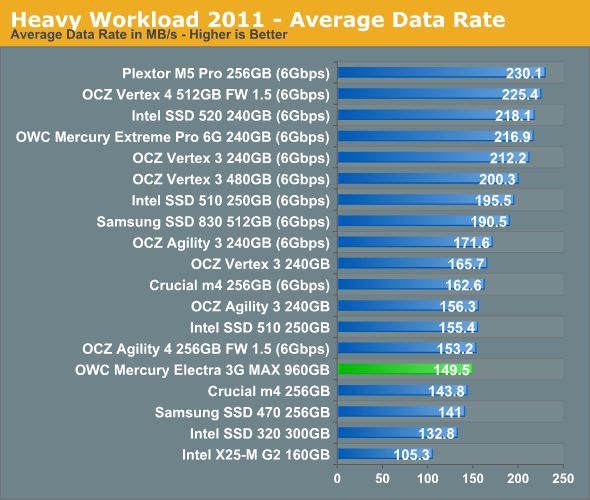
While the random performance of Mercury Electra wasn't great, it does surprisingly well in our Heavy suite. It's a bit slower than SF-2281 drives at SATA 3Gbps but it beats for example Intel's SSD 320.
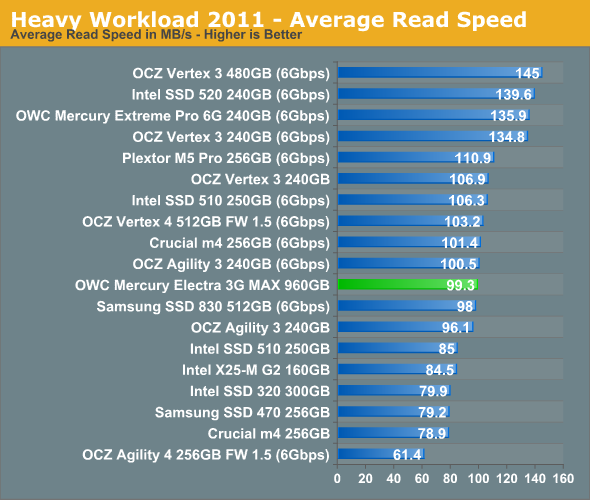
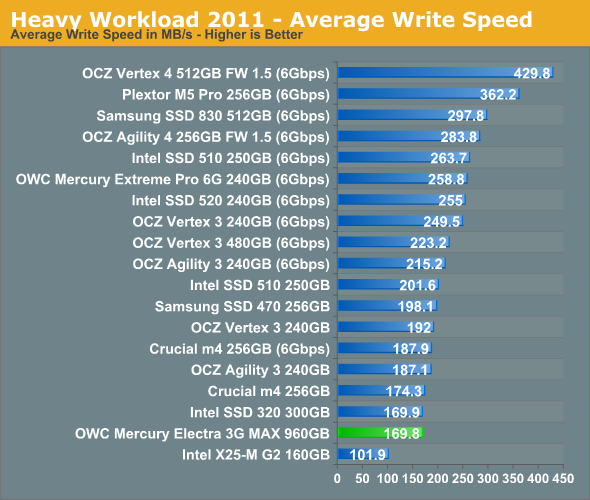
The next three charts just represent the same data, but in a different manner. Instead of looking at average data rate, we're looking at how long the disk was busy for during this entire test. Note that disk busy time excludes any and all idles; this is just how long the SSD was busy doing something:
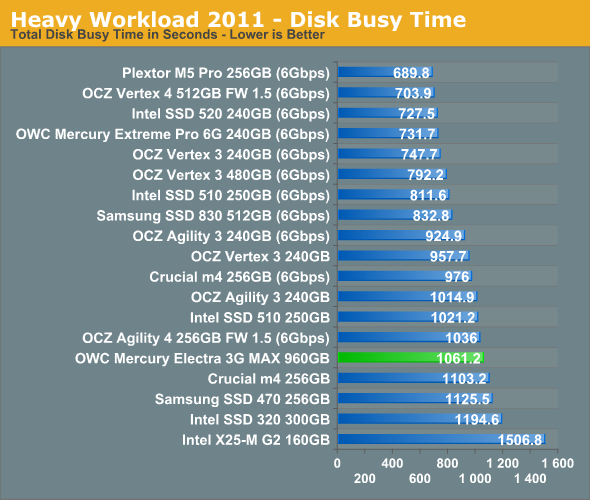
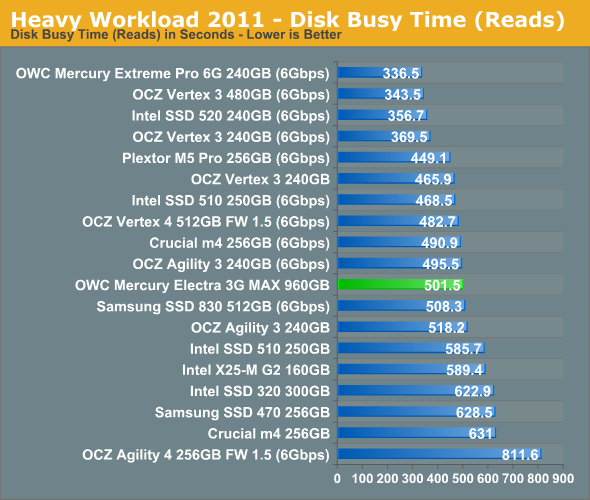
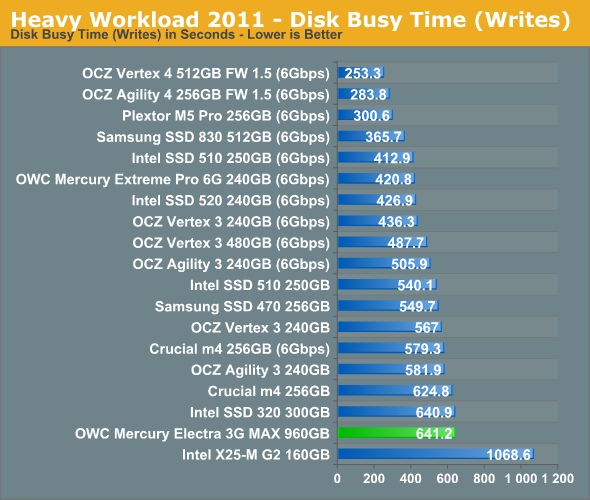










36 Comments
View All Comments
dishayu - Thursday, October 18, 2012 - link
I see 2x Crucial m4 in the charts? Is it the same drive running sata 2 and sata 6gbps?JarredWalton - Thursday, October 18, 2012 - link
Correct. The one line says "Crucial m4 256GB (6Gbps)" and the other is "Crucial m4 256GB"; there are a couple other drives tested on both 6Gbps and 3Gbps (Vertex 3 and Agility 3).jigglywiggly - Thursday, October 18, 2012 - link
yeah this is junk.just get a 500gb vertex 4
Argyris - Thursday, October 18, 2012 - link
I think there's one consideration that wasn't mentioned, and that's durability. I can't of course speak for this specific model (maybe the more complex internals could impact long-term durability, but most likely not), but for SSDs in general this is a major plus. I've been rather unlucky with HDDs and have lost two of them to physical impact damage. One of the main reasons I bought a SSD for my main laptop was so I don't have to worry about this happening again.If you're dependent on your laptop for your work and you need a lot of storage space (more than 512GB), the peace of mind of knowing that your whole livelihood's worth of data is safer than if it were on a spinning disc has got to be worth a few bucks.
Still, though, you have to wonder how many of these people couldn't get by for the time being with a 512GB drive (or the 768GB one offered by Apple).
Denithor - Thursday, October 18, 2012 - link
Well, first, if your data is so critical it should be backed up routinely on a very regular schedule. Offsite. Like every night, uploaded to a cloud drive somewhere.Which would effectively address the need for more than 512GB/768GB of "hands-on" high-speed storage - as everything not needed routinely could be kept on external drive and/or cloud storage.
Wolfpup - Thursday, October 18, 2012 - link
I'd generally trust a mechanical hard drive more than an SSD for reliability. The ONLY brands I'd trust for SSDs are Micron/Crucial and Intel...no way in heck I'd get a sandforce drive from someone else, and even then they haven't been 100% perfect.ArKritz - Saturday, October 20, 2012 - link
Great, more Samsung for the rest of us...yankeeDDL - Thursday, October 18, 2012 - link
I love the novelty: I think raid0 is a great solution to keep costs low, use the current hardware/NANDs.I also don't mind the performance. But the price?
There are already SSDs with costs below $1/GB. For 1TB, the cost of enclosure, assembly, boards ... should be proportionally lower. I think it would be fair in today's market to pay $750~$800 for this SSD, but no more.
I am still an SSD-skeptic at these costs: sorry but for me until I can get 1TB for less than $300, this is a no-no. Yes, I can install a mechanical HD for storing large files, but I dual-boot and ~100GB are always gone between Windows and Linux, so 256GB feel too tight and anything larger is still way too expensive.
JarredWalton - Thursday, October 18, 2012 - link
Note: editing to remove some referrals. Sorry, but if we leave those in we just encourage spammers and run the risk of more people doing this.RE: Love the novelty, not the price by amdwilliam1985 on Thursday, October 18, 2012
Check out Samsung 830 from amazon, I got the email this morning, man these are lovely prices. I got my Samsung 128GB for more than $150 a while ago.
samsung 830 128gb = $69.99
http://www.amazon.com/dp/B0077CR60Q/
samsung 830 256gb = $154.99
http://www.amazon.com/dp/B0077CR66A/
Not sure how long these prices will last.
If I don't already own an SSD in my windows 7 laptop, I'll be grabbing the 256gb for sure. Samsung and Intel has the best quality as far as I know in SSD.
DanNeely - Thursday, October 18, 2012 - link
Samsung is launching the 840 series drives; the 830 sales will probably end when inventory is depleted.